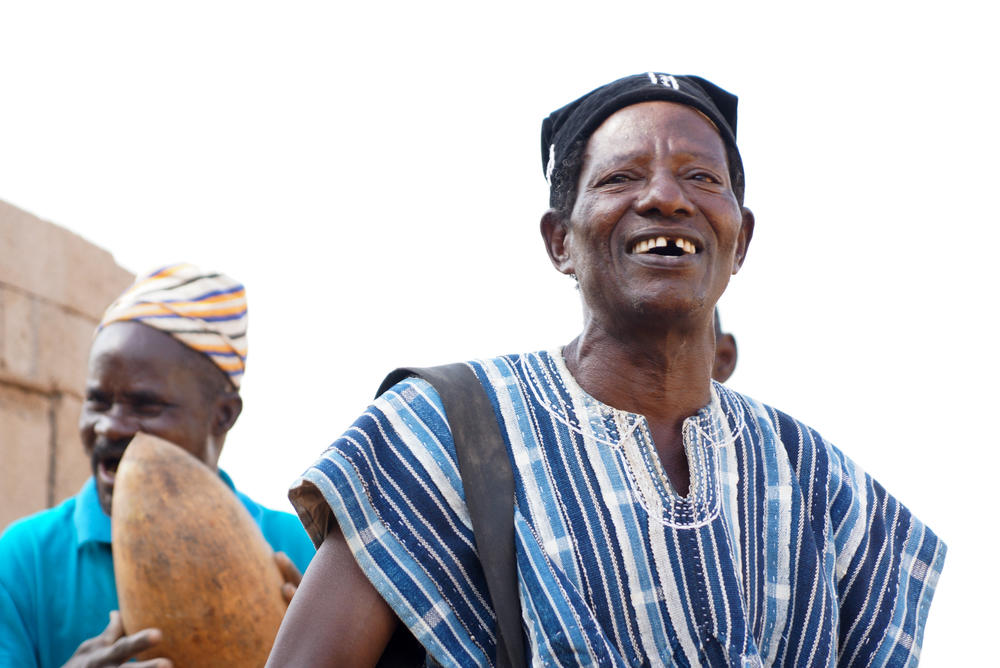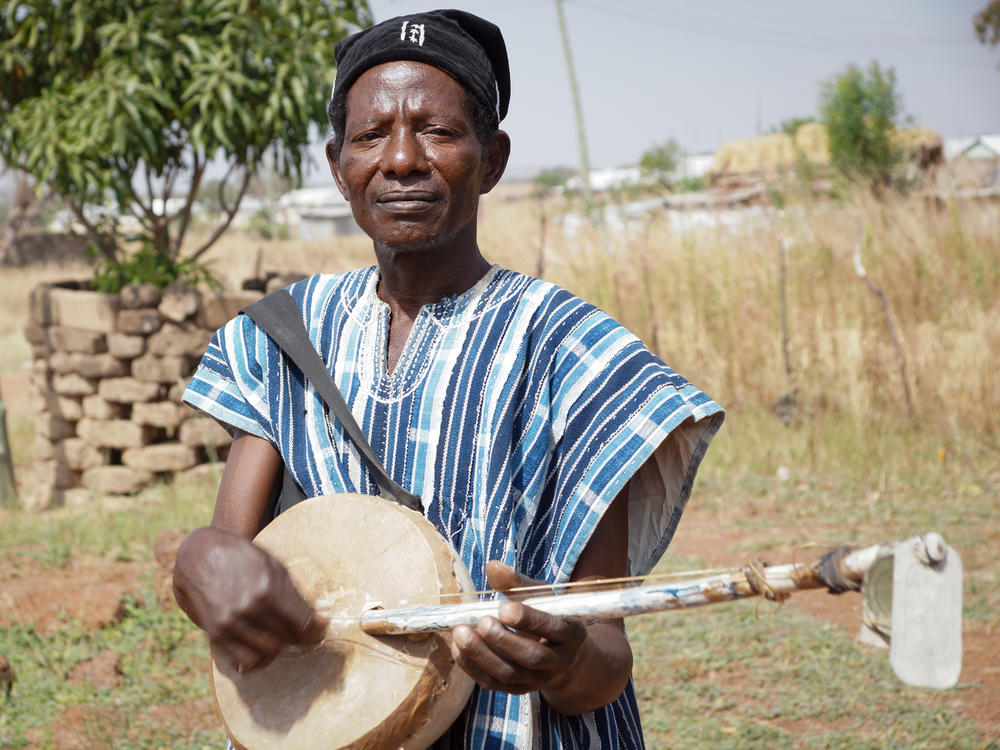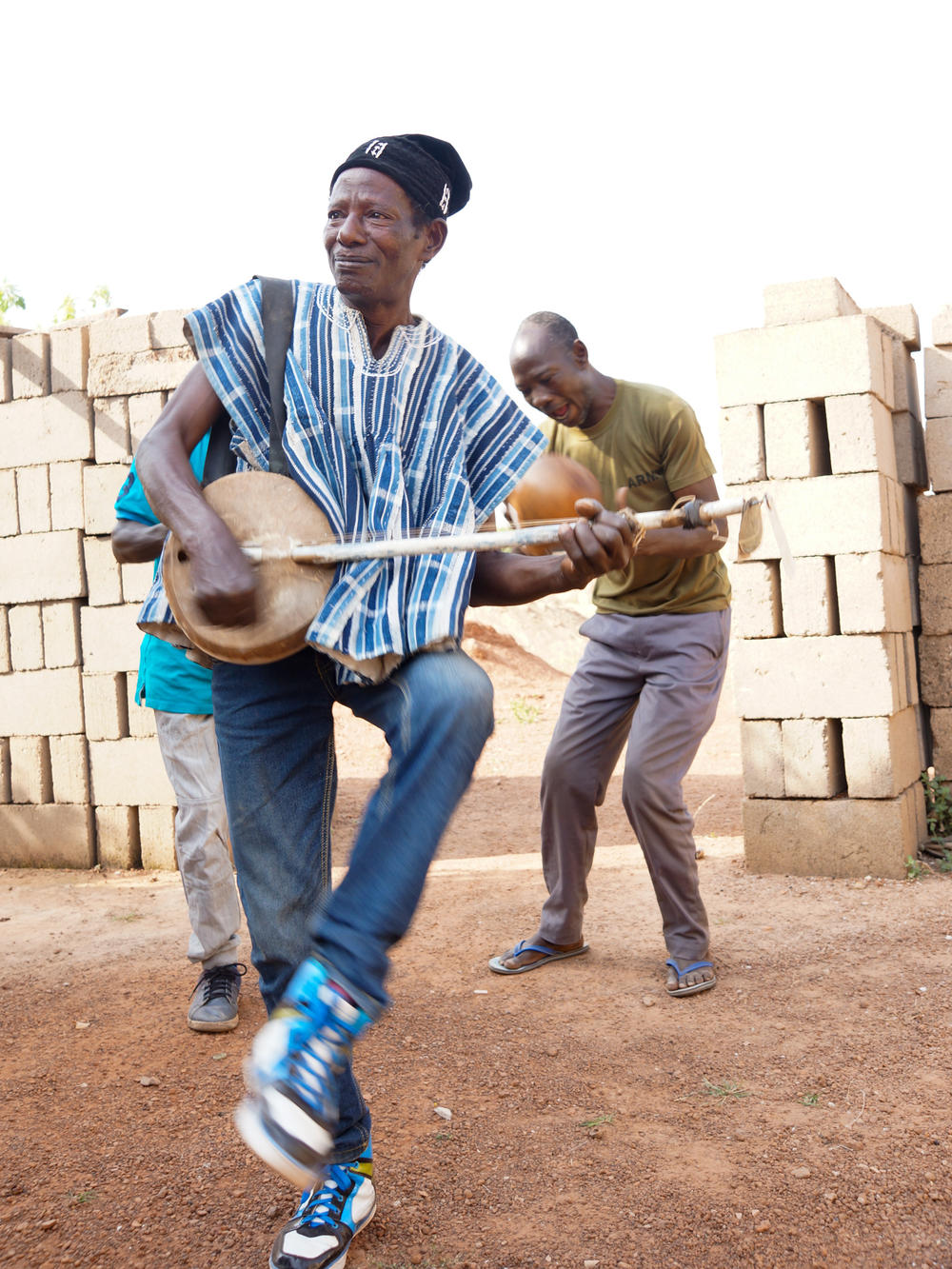Section Branding
Header Content
Remembering 'Small,' the funeral singer who made joyful music in the face of death
Primary Content
There is a sad irony in writing an obituary for a man who spent his adult life as a funeral singer.
For decades, Mbabila "Small" Batoh led his trio, fra fra, in providing funeral music throughout rural northern Ghana.
"Small," as he was widely known, played a homemade kologo (a 2-string lute)— with dog tags attached to the end for rattles. He belted original songs like "You Can't Escape Death" and "No One Is an Orphan" with a tenor of raspy virtuosity.
He could riff almost endlessly, and his performances grew freer and stronger past the 10-minute mark. At funerals, Small and his group would often play and sing from midday to long past dawn, ending only when the family felt that their loved one had been sung onward from this world and into the afterlife.
But their music was rarely sorrowful. Fra fra's exultant singing and dancing bear more than a passing resemblance to the boisterousness of New Orleans jazz funeral parades.
On Feb. 6, Batoh died, reportedly of COVID.
His death came in the midst of a career surge.
Following the release of fra fra's debut album Funeral Songs in 2020 (which I produced), Batoh was invited to perform at Peter Gabriel's 38th annual WOMAD Festival of music and arts, held in England. It would have been the fulfillment of his long held dream to travel outside of Ghana for the first time and perform abroad.
The festival was twice postponed due to the pandemic but was scheduled to happen this July, and Batoh remained eager to go.
I first encountered Small's music while visiting Ghana to record at the region's witch camps in late 2018. I heard tell of his funeral songs and after I searched him out, he expressed interest in making a record.
I set up and awaited the group at the assigned time and place— a gravel plot amid former farmland slated for development near Small's home. More than an hour passed. and I began to fear that the trio wouldn't show.
Then in the distance I heard faint music. Small and his comrades were playing before even coming into sight. The band arrived in procession, unhurriedly gyrating and zig-zagging their way toward me and continuing without pause when they arrived.
It was there on the outskirts of Ghana's northern hub, Tamale, beneath the midday sun, that I experienced one of the most powerful musical performances of my lifetime — the men encircling me and kicking up dust as they sang and danced.
Small was relatively short – standing approximately 5' 6'' – and that's how he got his nickname. The name also referred to the "small" money people donated for serenades. Small actually came to prefer this one-name moniker— reclaiming it from its derogatory connotations.
I had thought he was perhaps in his 40s or 50s until I saw Small's official documents for his passport application to travel to England. I was gobsmacked. Though he moved with the litheness of an adolescent— even duckwalking as he played— the man was a septuagenarian.
"Small was a legend to us locally. His song 'Naked' was a hit— a classic— in the community," says local taxi driver, Sammi Baisuru, 52. The song jests about how we all — rich or poor — enter and leave this world with nothing, not even the clothing on our back.
"He was a gentle soul who lived for people to be happy. If someone was sad, he wouldn't stop singing until he made them laugh and smile," says Basiru.
Small was born less than 25 miles from the Burkina Faso border, a two-day's drive and a world away from the modernity of the coastal capital, Accra. Like many from the north, Small never benefited from the post-colonial consolation prize of English-language skills.
He sang in Frafra (also known as Farefari) — a language with only around 300,000 speakers and spoken by fewer than 2% of the citizens even within Ghana.
Small — whose personal mantra was "be patient"— proved among the too few rural musicians who overcome geographic, linguistic and economic barriers to earn the right to play before a global audience.
"Small was good to everybody. He was peaceful and just, and always willing to help any one. No one really believes yet that he has died. They have a hard time even imagining that he is gone and have been coming to see for themselves if it is true," says his wife, Lariba Mbabila, 54.
Small devoted himself to alleviating the grief of others. Recordings of his own voice now help those closest to him mourn. Yet, in a gut-wrenching twist, Small's family finds themselves unable to fund his own funeral. Quite prophetically, his final release is the single, "Death Can Come at Any Time," for which all proceeds benefit his survivors.
For a lifetime Small led the way.
In the face of mortality, he danced.
Ian Brennan is a Grammy-winning music producer whose 37 records by international artists include Zomba Prison Project, Tinariwen and The Good Ones: Rwanda, You Should Be Loved. He is the author of seven books; his latest is Muse-$ick: a music manifesto in fifty-nine notes, published last fall by Oakland's PM Press.
Copyright 2022 NPR. To see more, visit https://www.npr.org.



